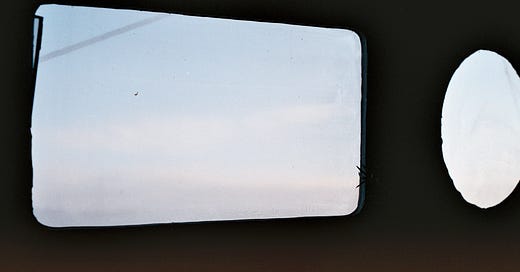I went to an aesthetician the other day for a consultation. She analysed my skin under a bright white light but not before asking me if I’d gone through any recent conflict separation. The question caught me off guard, as if I didn’t quite catch the words, and I asked her to repeat what she had said. “Everything that happens on the inside shows up on the outside,” she tells me. This makes sense, although my logical brain doesn’t truly compute it, despite understanding that emotions can manifest in strange physical ways. I think about the time stress and a bout of anxiety teetering towards depression stopped my period for three months.
“Not really,” I reply, explaining that I had a month of worrying about work not coming in earlier in the year. “But that’s about it. No break ups. No grief. Nothing too heavy.” She tapped away on her keyboard, and I thought about telling her that I’ve been anxious but not in an alarming way – in a background hum of a way that rattles but does not warrant too much concern – but then I remembered she was not my therapist and I waited for her to examine my outer layer, the veneer that had been compromised, whilst I stewed underneath.
The aesthetician also asks me about my gut microbiome and vitamin intake and I reply that I’m sure both could be improved but that overall I’m pretty healthy. The word felt funny in my mouth, so vague and unspecific, that I felt like I was lying or being defensive when I told her I didn’t consume much refined sugar.
Health has a lot of contradicting rules. It’s a catchall phrase that is both redundant and all-consuming, and has meant different things to me at different times of my life. As a woman, health has historically been adjacent to ‘skinny’. This later adapted to ‘fit’ or ‘strong’ but always ‘money’. Health is a market that I’ve bought into for three decades. Health is also ‘guilt’, especially when you have spent years of your life expelling it out of your system.
I believed the concept of health had really changed for me but upon further reflection, perhaps the definition hasn’t changed, but I have. I spend a lot of time thinking about what goes into my body, which is not unusual for someone who cooks frequently, writes about food, cares deeply about ingredients and has had an eating disorder.
Ten years ago my obsession with food was not out of love but out of hate. A short-term lust for deliciousness followed by long-term disgust at my body. It was about control and health was not vague or unspecific but instead boundaried and confined to the types of bodies I would never have. Fullness felt like a dirty word to me. There was actually nothing I hated more than being full.
It feels trite (and untrue) to say, ‘and now I am cured’. Health is a tricky, slippery, fickle, elusive beast that I’m forever chasing. I’m still trying to figure it out. I’m drinking water laced with apple cider vinegar because I heard that’s ‘good for you’, and dropped caffeinated coffee from my rotation, and I’m stupidly scared of telling people of all the ways I’m trying to ‘improve’ my health for fear that they’ll tell me it’s all a sham. I am still too delicate, frustratingly so, and it has made me realise that health is actually more about resilience than anything else.
Since having COVID multiple times, I’ve found that I get sick easier. This makes me want to build up my immune system more than it makes me want to lose weight. I’ve replaced ‘full’ with ‘whole’ and to me that makes more sense, because who wouldn’t want to feel more whole?
I still wonder if what I eat – or what I think about certain foods – is a reflection on those slightly disordered eating behaviours. It probably is. I tell people I don’t care about bread. I really don’t think I do, and friends have mockingly wondered if I'm just being contrarian, or overly patriotic to rice. It might be because I think about how bread sits in my stomach. Or how fries stick in my throat. It doesn’t consume my every thought anymore, and it doesn’t stop me reaching for it when I’m hungry.
Cooking has helped. It’s corny to say but of course the tactile act of taking a bunch of raw ingredients and turning them into a meal makes a difference.
I know that I’m susceptible to the constantly evolving definition of health – the marketed, capitalist concept that causes me to spend hundreds of pounds on supplements, or choose more expensive organic vegetables. I’m wary of writing ‘healthy recipes’ although I would say my chaotic formations of ingredients are ‘whole recipes’, instead.
It’s also impossible to feel 'healthy’ without interrogating those inner demons. Therapy helps, too. Although I’ll admit I’m not always totally forthcoming, preferring to talk about the woes of modern dating. It takes a lot to dig beyond the skin’s surface.
Everything that happens on the inside shows up on the outside.
It’s true. But I don’t want that mantra forcing me to absolve me of my chaos. Perhaps it’s good for the bad things to show up on the outside. I don’t think I could be whole without all of those conflicts or separations. Maybe I need to learn how to be ok with the visible imperfections. To not need to cover them up or cry about them in bed.
I imagine this is a lesson I’ll still be learning over the next decade.
If you liked this, you might like this essay from the archives:








I once read in a health magazine that our negative emotions can create harmful chemicals in our body. I’d forgotten about that…your essay reminds me of it, so I’m grateful to you for writing this.